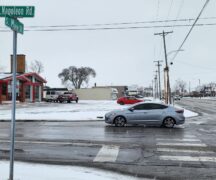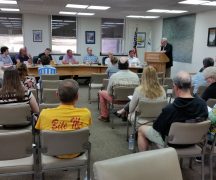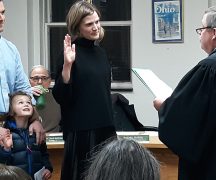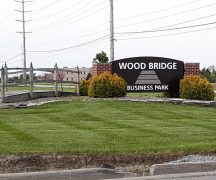By JAN LARSON McLAUGHLIN
BG Independent News
Bowling Green City Council divvied up close to $2 million in COVID relief funds Thursday evening.
Scoring pieces of the funding pie were pickleball courts, dog parks, and a multi-use path out to the community center.
Downtown projects also secured funding, including plans for public restrooms across from Wooster Green.
Non-profit agencies were top on the list for funding, since they continue to struggle to meet local needs due to COVID.
City Council received more than 450 funding suggestions from Bowling Green citizens, non-profit agencies, business and city government. Ideas were accepted earlier this year at public meetings, in an online questionnaire, in phone calls, emails and on social media.
The projects were scored on a rubric which ranked them on criteria such as the frequency of the requests, the continuing expenses required, the chances of matching or in-kind funding, the degree the project is already being address by another entity, whether or not the project was directly impacted by COVID, the number of BG residents who could be positively impacted, and the positive impact on the local economy.
“Each council member has their own list they scored themselves,” said Council President Mark Hollenbaugh.
Bowling Green received $7.2 million last year in American Rescue Plan Act funds designed to help communities recover from the economic impacts of the COVID pandemic.
The city had already approved using the funds for:
- $3 million for residential street paving.
- $350,000 for MARCS radios to improve public safety communications.
- $250,000 for paving at City Park, including road widening, a walking path, and security improvements.
- $100,000 for an inclusive playground at Carter Park.
- $300,000 for housing grants over three years.
That left about $3.2 million that the city can still spend. City Council member Nick Rubando suggested that council leave some money for uncertainties that may arise.
“This money doesn’t need to be allocated until 2024,” Rubando said. “If COVID taught us anything, we have no idea what the next couple years will look like.”
Non-profits
The first projects to get a slice of the funding pie were non-profit agencies serving local residents. Council member Bill Herald suggested funding for proposals from the Brown Bag Food Project, BG Christian Food Pantry, NAMI, Habitat for Humanity, La Conexion and Cocoon.
“We have quite a bit of money to allocate and I think it will send a good message,” Herald said. “This goes directly to those individuals affected by COVID.”
Council member Jeff Dennis agreed that the needs of non-profit agencies should be addressed. He suggested that the city develop a “robust grant program and adequately fund it.”
Council member Greg Robinette suggested that $500,000 be put in the fund to be administered by Martha Woelke, the city’s community development administrator. “I think everyone of them has made a strong case,” he said of the local agencies seeking relief funds.
Herald said the separate fund would add a layer of bureaucracy, but added, “sometimes that’s a good thing to add safeguards.” It was decided a city council committee will establish criteria for the funding.
For profits
A request for $500,000 from a group of downtown business owners prompted much discussion.
“We’ve all been receiving individual requests,” Robinette said.
Herald suggested that the funding be available to other local businesses – not just those downtown. “There are businesses affected elsewhere,” he said.
But council member Joel O’Dorisio said downtown businesses were hit first by street construction one year, followed by COVID the next. That meant two consecutive years of poor profits.
“I think it’s an extraordinary circumstance,” he said.
Herald said downtown businesses can express that in their funding applications – but the money should be made available to all local businesses.
“Businesses were negatively affected by COVID throughout Bowling Green,” he said.
Another issue was raised by Hollenbaugh about using the ARPA funds for businesses. “I am uncomfortable taking public tax dollars and passing it out to private business,” he said.
It was decided that this fund should also be administered by the city, with a council committee setting the criteria, size of grants, and how the money can be used.
Other projects getting pieces of the funding pie included:
Downtown improvements
- $75,000 for downtown public restrooms in the former drive-thru bank next to the police station. It was decided that waiting to build the restrooms until the police station is renovated several years from now was too long of a delay. “To me, we should have had restrooms downtown yesterday,” council member Rachel Phipps said.
- $100,000 for an alley revitalization project requested by the Downtown BG Special Improvement District. “This is a great investment for us to make,” Dennis said.
Park improvements
- $180,000 to help build the shared use path from the high school to the community center and to the Cogan’s Crossing housing development north of Bishop Road. The city has already secured a grant for 90% of the project which is already underway.
- $150,000 for the proposed pickleball courts next to the community center. Estimates for the project range to $800,000 for a concept plan with everything included. By allocating some funds now, the project will be better equipped to apply for grants and matching funds, Robinette said. “I think it’s worth us dedicating some funds to this,” he said. The board kept going back and forth on funding amounts, but decided on $150,000. “Parks were a real godsend to people during COVID,” Herald pointed out.
- $150,000 to go toward establishing walkable dog parks closer to city neighborhoods. This funding will help the citizens group pushing for the dog parks to secure matching grants. “This is a great example of a citizen-initiated movement to improve our park system,” Herald said.
- $20,000 to update and improve the disc golf course in Carter Park. “You can never go wrong investing in parks in Bowling Green,” Dennis said.
Other funding winners:
- $350,000 to pay for inflationary cost overruns in the city’s residential street paving program. “These are projects that are underway and underfunded,” Hollenbaugh said, due to supply chain issues, labor shortages, and inflation.
- $75,000 for an innovation and entrepreneurship accelerator feasibility analysis and business plan requested by BG Economic Development.
- $100,000 annually for the next three years for housing assistance grants offered by the city for owner-occupied homes..
- $25,000 for a feasibility study for a hike-bike trail from Crim Elementary School to Carter Park. The funding was requested by the East Side neighborhood residential group.
A request was put on hold for a feasibility study to improve pedestrians’ experiences in the downtown area. Possible ideas include a “road diet” study, crosswalk improvements and speed cameras. Mayor Mike Aspacher said these ideas could be addressed in the new downtown visioning project.
A community tennis partnership project did not receive funding, but Dennis and Aspacher said the city can have conversations with Bowling Green City Schools to see if a joint project is possible.
Not funded but staying on the list were bicycle and pedestrian infrastructure improvements, which may be addressed by the city through its bicycle treatment study.
Though not on the list of projects prior to Thursday evening, Herald suggested that money should be put toward sidewalk improvements. “We have more on the list than money available,” he said of the priorities set by the city’s sidewalk commission.
While council members agreed that several sidewalks need improvement, it was decided they should be addressed later.





